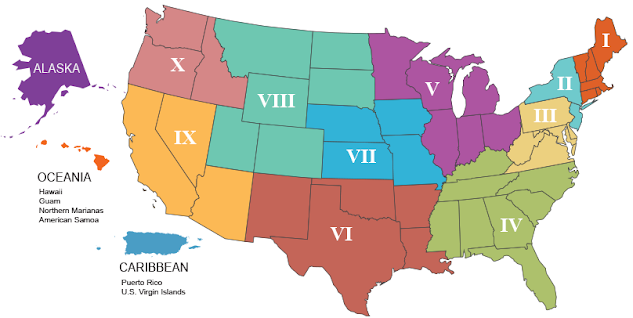Why should I be a Regular Participant with my Regional Response Team (RRT) and Area Committees (AC)?
Under 40 CFR 300.105 – General Organization Concepts, the National Oil and Hazardous Substance Pollution Contingency Plan (NCP) details this nation’s national response organization when responding to oil and other hazardous material incidents. There are three levels of preparedness planning coded into regulation (from 40 CFR 300.105 (a)):
- Plan [ning] for emergencies and develop [ing] procedures for addressing oil discharges and releases of hazardous substances, pollutants, or contaminants;
- Coordinat [ing] … planning, preparedness, and response activities with one another;
- Coordinat [ing] … planning, preparedness, and response activities with affected states/Tribes, local governments, and private entities; and
- Mak [ing] available those facilities or resources that may be useful in a response situation, consistent with agency authorities and capabilities.
The tasks named above are shared between the following basic national framework for a response.
- National Response Team (NRT) - responsible for national response and preparedness planning, for coordinating regional planning, and for providing policy guidance and support to the Regional Response Teams (RRTs).
- RRTs - responsible for regional planning and preparedness activities before response actions, and for providing advice and support to the OSC / RPM when activated during a response. Representatives from EPA and USCG co-chair each standing RRT. States are represented by state environmental agencies or emergency management officials. Federally recognized Tribes are also recognized as having governmental authority over lands belonging to or controlled by the Tribe. In addition, representatives from industry, environmental organizations, and civic groups may also make important contributions to RRTs, although they are non-voting members.
- Predesignated On-Scene Coordinator (OSC) and the lead agency Remedial Project Manager (RPM) - primarily responsible for directing response efforts and coordinating all other efforts at the scene of a discharge or release.
- Area Committees (AC) - responsible for developing, under direction of the OSC, Area Contingency Plans (ACPs) for each area designated by the President. Composed of federal, state, and local agency representatives, as well as Tribal and industry representatives.
Did you know that there is also a place for private entities like our members to participate and be involved at the RRT and AC level? Your participation will ensure that your viewpoint is heard and addressed (when applicable) in the planning processes by these bodies. Under § 300.185 Nongovernmental Participation is codified into the NCP. Your involvement and regular participation provides you and your organization with many benefits:
- Knowledge of policies and issues for your specific region(s) or area(s).
- Develop working relationships, exchange information, and develop regional policies and procedures for responses.
- RRT and AC Meetings provide forums for adopting policies, reports on incidents in the region, and discussing lessons learned from responses.
- Participate in workgroups that focus on specific priority tasks.
- Participation in planning updates and new initiatives within the Region/Area.
- Regular interaction with the federal, state, Tribal, and local response communities
- Better understanding of the Environmental Tradeoff Analyses conducted during the response
- Participation in drills and exercises within the Region or specific Area
Knowledge is power. Become involved at the Regional and Area planning levels – your effort will not be wasted! Visit https://www.nrt.org/Site/Regionmap.aspx to locate your RRT(s). Drilling down into each RRT home page provides you with access to links for your local Area Committees as well. There are many resources and documents also available at these sites as well as the planning documents that currently dictate the Region / Area response for each location.
February 2022 – RRT Meetings
- Region IX - SF Bay & Delta Area Committee Meeting - Tuesday, February 8th
- RRT IV – Feb 8-10, 2022, Gulfport, MS. For more information: R4RRTAdmin@epa.gov
- RRTVII – March 23-24,2022 – EPA Cave Warehouse, 8600 Underground Road, Pillar 253, Kansas City, MO, For more information: RRT Coordinators – Eric Nold (Nold.Eric@epa.gov) and Todd Peterson (todd.m.peterson@uscg.mil)
- RRT X – March 9-10, 2022 – To be determined. For more information: Lori Muller (muller.lori@epa.gov) and Elizabeth Petras (Elizabeth.j.petras@uscg.mil)
- RRT Alaska – February 17, 2022 – Atwood Conference Room, Anchorage, AK or ZoomLink - https://usepa.zoomgov.com, Meeting ID: 161 6961 3152, Passcode: 9073124310. For more information: Marc Randolph (marc.a.randolph2@uscg.mil), Mary Goolie (Goolie.Mary@epa.gov) and Allison Natcher (allison.natcher@alaska.gov)
These dates are based on the best available information. If you know of any meeting changes, please send an email to provide the updated information.
We Need Your Help on Area Committee Meeting Dates:
SCAA members, we’re trying to stay on top of Area Committee (AC) Meetings; they are not as easy to track as RRT meetings. If you are already regularly attending and have any future AC meeting dates, please forward to dscholz@scholzllc.com. Thanks in advance.

Comments
Post a Comment